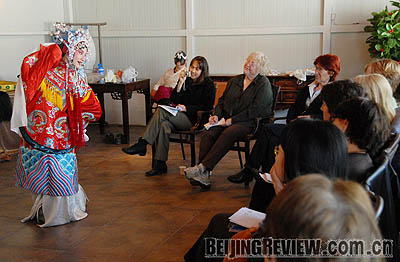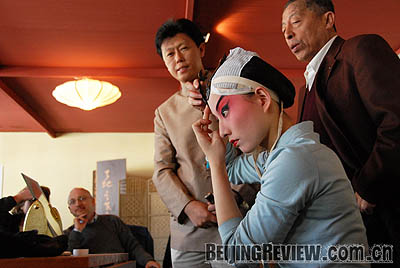| 
NATIONAL TREASURE: A group of foreigners enjoy a Peking opera performance during a workshop on March 7 at the Chinese Culture Club in Beijing (Photo by WEI YAO)
A young woman sits before a table and mirror in a large and quiet classroom and applies face powder, rouge and eyebrow pencil before a semicircle of spectators. A palace floor lantern, antique furniture, wash painting scrolls and calligraphy adorn the room. While the woman, a Peking opera actress, puts on gold embroidered robes and shining jewelry, a man in typical Chinese-style coat, stands beside the table and explains to the audience the significance of Peking opera makeup and costumes.
Many of the foreigners already know the man who is in his late 30s. Sometimes his amusing answers to their questions trigger occasional laughs. He is Feng Cheng, the founder and owner of the Chinese Culture Club (CCC), an entrepreneurial endeavor that he started single-handedly eight years ago to spread his knowledge and love of Chinese culture with foreign residents and visitors in Beijing.
Today, CCC offers a range of hands-on classes, workshops such as the Peking opera class, Chinese language courses, lectures and discussions, walking tours, activities in the Beijing area and trips to almost every province of China. Many foreigners who regularly participate in CCC's activities consider Feng's business one of the best of its kind. CCC has helped make Chinese culture accessible for people from other countries, as China has blossomed economically and more foreigners have relocated here for jobs.

FACE PAINTING: Feng Cheng, founder and owner of the Chinese Culture Club (standing, left), explains the significance of Peking opera makeup at a workshop on March 7 in Beijing (Photo by WEI YAO)
Feng first got an inkling for creating a club where he could meet foreigners and hold activities for them to learn about Chinese culture when he was a journalist at China Daily, the country's English-language daily newspaper. After working there for two years, Feng said he found the newspaper's culture reports to be too dry and unattractive.
"I liked traditional culture myself, but some of those articles were hard for me to understand, let alone foreigners," Feng said. That's what got him thinking about a club for the newspaper's readers-mostly foreigners. He came up with a simple plan to organize the club and its activities in addition to performing his regular reporting and writing responsibilities. In the beginning, his mission did not appear to be complicated.
"At first, I simply wanted to introduced Chinese culture to foreigners in a vivid and interesting way," Feng said.
But the extra work quickly took a toll on him and he started to burn out. His coworkers questioned the amount of time he spent on the club's activities.
"I was exhausted, and a few of my colleagues didn't understand [my activities], because they thought I was not concentrating on my job duties," Feng said.
Feng, who has a master's degree in English, formally set up the Chinese Culture Club in 2000 and started to organize some activities in his spare time. He set up a website for his services, even though at that time there were few agencies that offered similar activities for foreigners. All CCC courses were free of charge, because Feng wanted the club to become a kind of salon where his foreign friends could learn about Chinese culture. But he ended up spending almost all of his salary on the club.
In 2004, Feng, who comes from northern China, decided to leave his job at the newspaper and invest all his time and energy in CCC.
"My parents thought I was crazy," he said. "I was in my 30s, but I was still single because I was too busy to think about my love life. Then, I gave up such a good job with a stable income. Now they can understand my decision."
After a while, Feng maxed out his savings and had to start charging for the courses. But his expenses always exceeded his costs. As more foreigners joined the club, they asked him to organized trips to other parts of China. At that point, Feng had to start hiring other people to help him arrange the tours. He used the profits from the tour business to support the training courses. As the tour side of the business has developed, Feng has added more trips that go off the beaten path.
| 